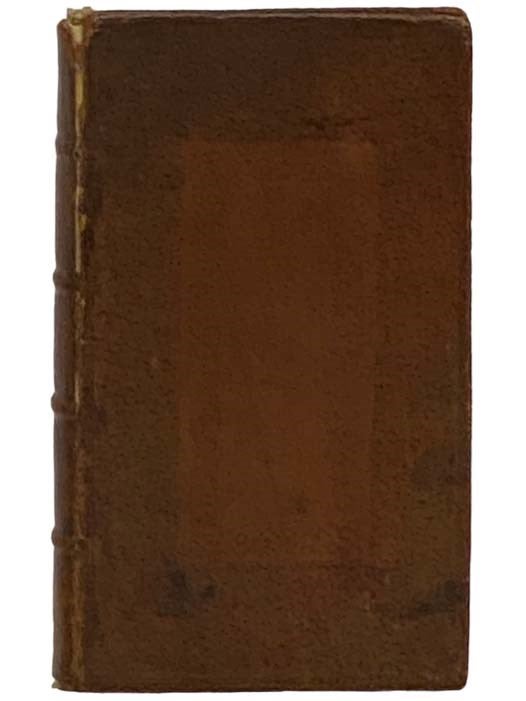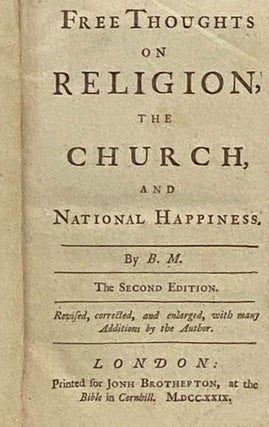Free Thoughts on Religion, the Church, and National Happiness.
London: Jonh Brotherton, at the Bible in Cornhill, 1729. Second Edition. Full-Leather. Very Good / No Jacket. Item #2329103
Second edition (ESTC T106235). Both joints beginning to split, front more so than rear, with minor loss from spine head and foot, quarter-sized spot on rear board which appears to be some sort of clear lacquer. Text clean and unmarked, binding tight and holding firmly.
xiv, [2], 409, [1], xxii, [4] pp. Full calf, four raised spine bands, speckled edges, blind stamped rules and inner board decoration. This second edition, published nine years after the first, includes substantial additions and corrections, and is about twenty-five percent longer than the original. It was influential, particularly in Germany, where it was printed in several editions. Routledge, in reference to a recent scholarly reissue of the text, states "Bernard Mandeville was best known for The Fable of the Bees, in which he demolishes the supposed moral basis of society by a Hobbesian demonstration that civilization depends on vice. Today Mandeville is seen as a trenchant satirist of the manners and foibles of his age. He is also seen as a precursor of some of Adam Smith's doctrines, a forerunner in the field of sociology. A prescient analyst of the dynamics of our modern consumer society, Mandeville is author of a striking naturalistic account of the gradual evolution of modern society from its primitive antecedents. His literary signature, in a manner of speaking, is his famous paradox, 'private vices, public benefits.' To understand Mandeville's Free Thoughts, one needs to situate it within the context of the religious and political controversies, ongoing subversion, fear and dormant warfare of his times. Those would eventually erupt again and for the last time in the bloody Jacobite rebellion of 1745-46. The first five chapters of the book explore religious and theological issues including the nature of belief and knowledge, the significance of rites and ceremonies, and controversies about Christian mysteries such as the Trinity and free will and predestination. The next five chapters explore controversial issues of church politics, including persecution and toleration across the centuries, the basis of Mandeville's anticlericalism. In the eleventh chapter, he turns aside from matters of religion to review the balance of powers in Britain's government, a mixed or limited monarchy. The final chapter is essentially a repetition of Mandeville's pleas for civil and religious peace through mutual toleration by opposing religious parties. Mandeville's work is of continuing interest to students of culture and history, religion and theology, and political science."
Price: $950.00




